There are two traditions I’ve maintained on this blog ever since I began blogging. One is to celebrate my birthday with a pertinent post (coming up in two weeks’ time). The other is to, for Christmas, review a Christmas-themed film (of which there are examples aplenty). For once, though, the Christmas film I’ve chosen is one with a difference. It’s a Western, and – while it doesn’t have any actual blood and gore shown – there is death here. It’s not a sugary film, and even though the first half has its share of humour, the final impression is one of a bittersweet story of a world that isn’t quite black and white.
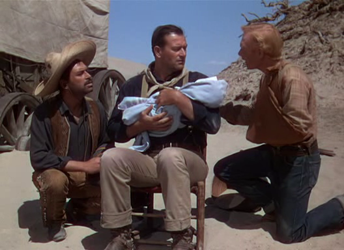 3 Godfathers begins just outside of a fictional Arizona town named Welcome. Three riders, having stopped recently at a waterhole to fill up their water bag, draw rein and look at the Welcome signboard, and have a laugh. Because these three are heading into Welcome to rob the local bank. Robert ‘Bob’ Hightower (John Wayne), Pedro ‘Pete’ Roca Fuerte (Pedro Armendáriz) and William Kearney (better known as ‘The Abilene Kid’; Harry Carey Jr.) are outlaws, fresh from cattle rustling, and looking for greener pastures. Greener as in the long green.
3 Godfathers begins just outside of a fictional Arizona town named Welcome. Three riders, having stopped recently at a waterhole to fill up their water bag, draw rein and look at the Welcome signboard, and have a laugh. Because these three are heading into Welcome to rob the local bank. Robert ‘Bob’ Hightower (John Wayne), Pedro ‘Pete’ Roca Fuerte (Pedro Armendáriz) and William Kearney (better known as ‘The Abilene Kid’; Harry Carey Jr.) are outlaws, fresh from cattle rustling, and looking for greener pastures. Greener as in the long green.
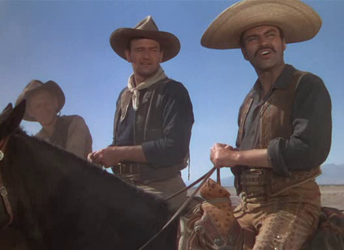
Our three anti-heroes ride into town, and are soon greeted by a cheery old gentleman who’s busy tending his garden. Buck ‘Perly’ Sweet (Ward Bond) is welcoming and kind; his wife, Mrs Sweet (Mae Marsh) is even sweeter—she actually brews coffee for the three passing visitors. Bob, Pete and the Kid have their coffee pretty much sitting in their saddles, but the Sweets strike up a conversation with them nevertheless.
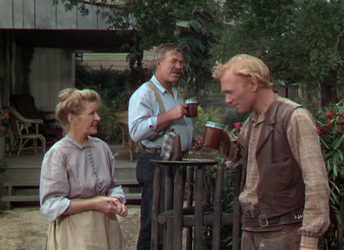
Christmas is coming up, and Mrs Sweet is looking forward to the arrival of her sister-in-law and her husband. They’re coming from New Jerusalem; surely these three men must have seen them at Terrapin Tanks, since they’ve come that way? (Bob has spun a yarn about where they’ve come from, since he doesn’t want to let anyone in on the fact that these three have ridden from a place where there’s been recent rustling going on).
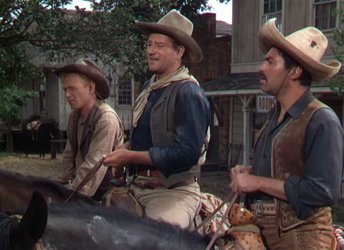
Having finished their coffee, the men thank their hostess and are swinging away on their horses when Perly Sweet shows himself in his true colours: with the gleaming badge of a US Marshall pinned on his chest. This man, obviously, isn’t quite the gentle old buffer they’d mistaken him for. And he has his suspicions. He doesn’t outright accuse the three of anything, but he’s not taking them for granted.
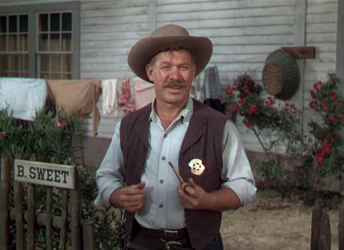
Not that Bob, Pete and the Kid are going to be put off by a little thing like that. As planned, they rob the bank—the Kid waits outside, holding the horses, while Bob and Pete rush in and hold the place up. There’s an immediate uproar in town, and the three outlaws make a hasty exit. With the money, but pursued by Perly Sweet and a couple of other men. This is where a few good shots from Perly Sweet cause damage that will change the course of the three men’s lives: one shot hits the Kid in the upper arm; another shot kills the Kid’s horse; and a third shot punctures the precious water bag.
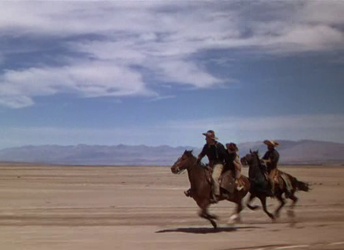
Bob manages to pull the Kid onto his own horse and they make their escape. Perly Sweet, meanwhile, gathers a posse and quickly makes his own plans, based on where he thinks the outlaws will be headed…

…which is Mojave Tanks, south of Welcome. And he’s right, because now that their water bag is riddled with holes and all they’ve got is a small canteen of water, Bob & Co. need to find water quickly. Especially as the Kid, having lost all that blood, isn’t in the best of shape.
The three outlaws, therefore, make their way to Mojave Tanks (and in their joy at seeing the water up there, just ahead, drench themselves with the last of the water in their canteen—silly thing to do).
And, before their dismayed eyes, up comes a-steamin’ and a-hootin’, a train bearing Perly Sweet and his posse. The cunning Marshall leaves a handful of men there to guard the water tank, and goes off on the train with the rest of his men.
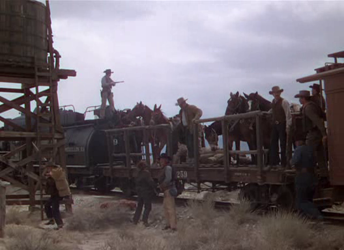
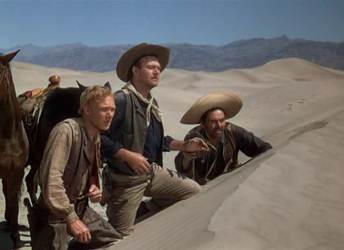
Now Bob has to find another place to get water. And fast.
He quickly outlines the plan for Pete, while the Kid rests. Now that Mojave Tanks is, for all practical purposes, off-limits for them, the next closest place they can get water is Apache Wells, which lies to the east. On the other hand, Perly Sweet is almost certain to have come to the same conclusion: that Bob & Co. will be heading for Apache Wells—that’s in fact where Sweet will have gone on by train. That, therefore, isn’t an option for them. The options, then, are either to head south to Mexico—60 miles, too far—or to go north, to Terrapin Tanks.
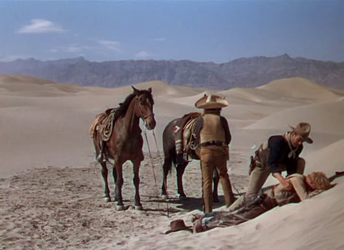
So they turn and head for Terrapin Tanks. It’s a long, gruelling ride through some frighteningly hostile terrain, all desert and little vegetation. And sand, which blows up into a dreadful sandstorm, forcing the three men to shelter in the lee of a dune and cover themselves with their oilskins.
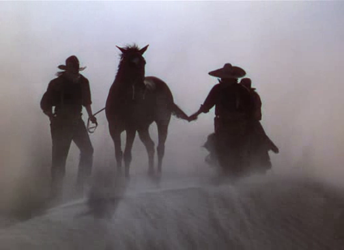
When the storm finally stops and they crawl out, it’s to find that their horses have vanished. Run off, and God alone knows where. Now Bob, Pete and the Kid aren’t just tired and thirsty (and, in the case of the Kid, wounded); they’re also afoot.
But they plod on, heading for Terrapin Tanks.
..and when they get there, find that disaster has struck.
Bob goes ahead of Pete and the Kid in order to scout around, and returns with grim news. A wagon from the east has drawn up at Terrapin Tanks, and the man who was driving it—typical greenhorn, oblivious of how to survive in the West—found that the tanks contained only damp mud. Instead of digging and then waiting for the water to fill up, he did the unthinkable: dynamited the place in an effort to draw water. As a result, the entire place has fallen in, and cascading rocks have closed up any chance of Terrapin Tanks ever yielding water again.
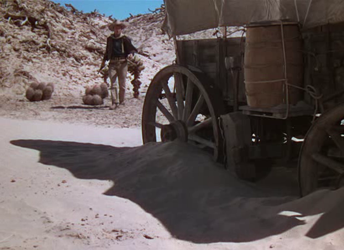
That’s not all. The man allowed his mules to try and quench their thirst at the alkaline-laced wet soil at the rims of the tank, and the animals went loco because of that—and fled. The man ran after them, and nothing has been seen of him, or the animals, ever since. It’s been four days. A greenhorn, in a land like this? He’s dead. Without a doubt.
I’m beginning to think Bob is a tracker beyond anything I’d ever imagined, but it turns out, no. Because all this information he’s received from a survivor: a woman who’s in the wagon, all alone and about to give birth.
Pete is the only one amongst the three of them who has any experience with being a father, Bob points out. He’s married, isn’t he, and has children? Well, he should help the woman. This is her first baby, and she’s frightened and alone. She needs help. Pete is initially reluctant—after all, he’s no doctor, and he admits his wife managed most of her birthing herself—but he gives in, and goes to the wagon…
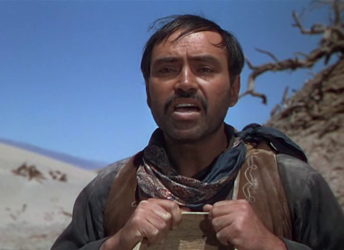
…while Bob and the Kid start frantically to lop off the tops of barrel cacti and squeeze the flesh to gather, drop by painstaking drop, water from it. It takes ages, and they’ve barely managed to get a small canteen of it before Pete has hurried out, taken the canteen from them, and gone back inside.
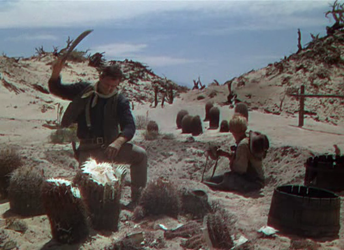
The baby is eventually born, and Pete comes out of the wagon to tell his two friends that the new mother would like to meet them.
The baby’s mother (Mildred Natwick, looking a trifle too old to be the “28 or 30 years” Bob had described her as) looks surprisingly clean to have given birth in such dire and waterless circumstances. Even more surprisingly, it emerges shortly after that she’s dying. And that she wants these three men who’ve helped, in their own ways, to bring her son into the world, to be his godfathers. They should bring him up, teach him right from wrong (ironic, this, considering these men are outlaws).
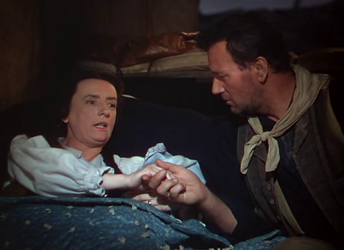
She makes them promise. She even names the baby after them: Robert William Pedro Hightower. (It’s interesting to note that she never mentions the baby’s family name: it’s almost as if this child has no identity other than the one conferred on him by his association with Bob, the Kid, and Pete).
Having kissed her baby, the woman dies.
And the three outlaws suddenly find themselves saddled with a newborn they have not the faintest idea how to rear. There are some laughs here as they bumble along, using a how-to-bring-up-baby guide they find in the wagon, along with clothes the dead woman had made for her infant. They’re a singularly inept trio, not even sure how often a baby must be fed, or how. Their love for little Robert (“Robert William,” stresses the Kid, and “Robert William Pedro,” adds Pete), however, is unmistakable.
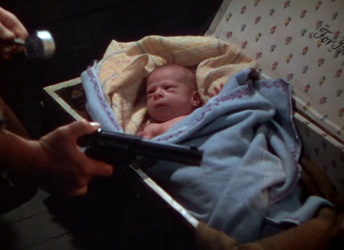
But love isn’t enough, and neither is the condensed milk, the helpful little guide, or the clothes. The three men know they have to move on; the barrel cacti have all been slashed up and used, and if they have to save the baby, they have to get to water soon. The most practical place to head for would be New Jerusalem, decides Bob. And, as the Kid says, looking up into the night sky at a bright star that hangs above, they have a light to guide them to their destination, too.
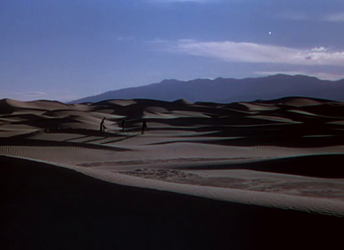
So they set off, battling the terrain, trying desperately to get to water before the aridity of the desert kills them… and somewhere far away, Perly Sweet continues to search for the men who robbed the bank.
Remade several times in different avatars, 3 Godfathers is an unusual Christmas tale, in that it doesn’t have any of the trappings one typically associates with Christmas movies. There are no Christmas trees and decorations, there’s only one very brief—not even complete—rendition of a Christmas carol, and there is none of the frothy charm of films like Christmas in Connecticut. It does, however, have more than a passing reference to Christmas: the birth of a baby, alone and in dire peril. The star that guides. New Jerusalem. And, the three men, strangers (but wise? Who knows? Or, as the film seems to suggest eventually, yes. Definitely wise, if wisdom can be equated with humanity and a readiness to follow that Biblical dictum: Greater love hath no man than this, that a man lay down his life for his friends).
What I liked about this film:
The story. This was a lovely little tale, bittersweet and sad, yet eventually hopeful. I liked the idea of three relatively hardened men—not cruel, not brutal, but definitely no softies—being changed because of the responsibility that is thrust on them. A responsibility, and their response to it, that proves that everybody has some humanity in them.
The landscape. Filmed in California’s Death Valley, 3 Godfathers is one of the most visually stunning Westerns I’ve ever seen: every frame is gorgeous. The brilliant John Ford, after all, was the director, a man known for some of the best Westerns ever to come out of Hollywood, including Stagecoach and The Searchers. 3 Godfathers is—along with True Grit—right up there when it comes to showing the West in all its beautiful (and, in this case, forbidding) glory.
The overdoing of some of the symbolism. I get that the baby and the three wise men form the central motif; even that the journey across the desert might be equated with the flight from Egypt. Also New Jerusalem as the place they eventually have to turn their footsteps towards. But the star, guiding them to New Jerusalem? That’s stretching things a bit. And there’s another very blatant Biblical symbol (so blatant, in fact, that the relevant Bible passage is actually read out by a character) that turns up towards the end of the film. That had me rolling my eyes, because it wasn’t mere coincidence; it was illogical.
Still, despite that—and a wee bit of melodrama in some places, especially near the end—this was a good film. A different film. A film, really, about what Christmas is all about: love for one’s fellow beings.
Have yourselves a merry little Christmas, everyone. And a great New Year.

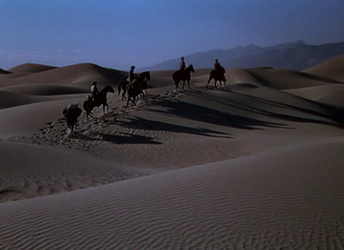
Madhu ji,
Thank you very much for the Christmas and New year wishes and a great review.
From your review it appears to be a good and watchable movie, in spite of the aberrations mentioned by you. Intend to watch it this weekend.
“A film, really, about what Christmas is all about: love for one’s fellow beings”
Aptly said.
Let me too wish you and your family a very happy Christmas and a wonderful New Year.
LikeLike
Thank you so much, Venkataramanji! My very best wishes for you and your family.
The film, while it does have those minor aberrations (which were, actually, just irritants for me. Not intolerable, just a little out of place in a film like this. If something like that had appeared in an old Hindi film, I would probably not have been too bothered). But do watch it: it is definitely worth a watch.
LikeLike
Thank You
LikeLike
Merry Christmas! This film appears to be something quite up my street and of course the icing on the cake is John Wayne. There is an older version of the film on You Tube, maybe I have to make do with that.
LikeLike
Thank you, Shilpi! I have varied opinions about John Wayne: I liked him a lot in early films like Stagecoach (and, though it’s from a later period, The Quiet Man, but not so much in some others. This one, though, was a sweet film, reassuring and heartwarming.
Is the version you found on Youtube from 1939? I saw, on the IMDB message boards for the 1948 version, some people saying that they thought the 1939 version was better – more poignant, less ollywood-ish. I haven’t seen it myself, but if you do, tell me what you think of it.
LikeLike
It could be, it is black and white.
LikeLike
The film is superb. I have watched twice and totally impressed. Awesome one. Thank u for the review.
LikeLike
Thank you so much! I’m glad you liked the film. I thought it was a lovely little affirmation of the true spirit of Christmas – humanity and goodness.
LikeLike